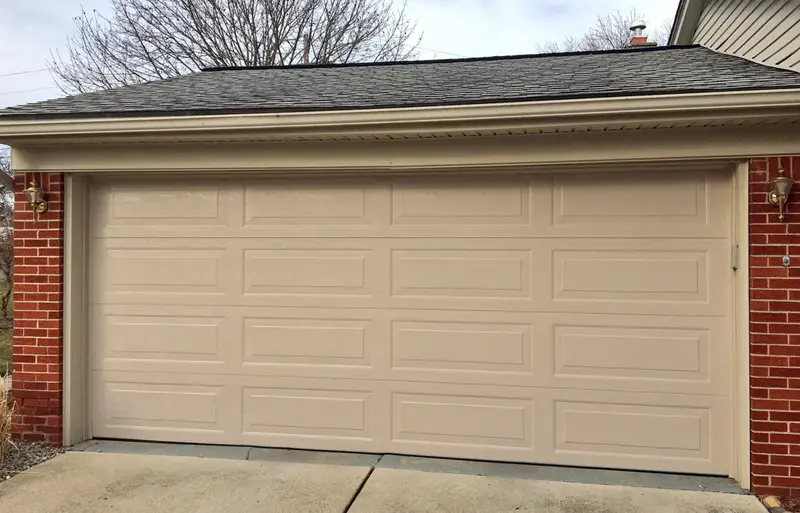How Much Is a 16×7 Garage Door Installed

Installing a 16×7 garage door is a significant investment, and the total cost can vary depending on multiple factors. The material, insulation, design, additional features, and labor rates in your area all play a role in determining the final price. Whether you’re upgrading your current garage door or installing a new one, understanding these cost factors will help you make an informed decision.
In this guide, we’ll break down everything you need to know about the cost of installing a 16×7 garage door, including price ranges, factors that influence costs, and tips to get the best value for your investment.
1. Garage Door Material Options
Choosing the right material for your garage door is crucial in determining durability, maintenance, and aesthetics. Here are the common material options along with their costs and pros and cons:
a. Steel
- Price: $750 – $1,500
- Pros: Durable, low maintenance, available in various colors and styles.
- Cons: Can rust if the protective coating is damaged.
b. Aluminum
- Price: $1,000 – $2,000
- Pros: Lightweight, rust-resistant, ideal for large garage doors.
- Cons: Less impact-resistant compared to steel.
c. Wood
- Price: $1,500 – $3,500+
- Pros: Classic and warm aesthetic, customizable.
- Cons: Requires regular maintenance and is susceptible to weather damage.
d. Fiberglass & Composite
- Price: $1,200 – $2,700
- Pros: Durable, low maintenance, mimics wood appearance.
- Cons: More expensive than steel, limited design choices.
2. Insulation for Energy Efficiency
If your garage is attached to your home or used as a workspace, insulation is crucial for temperature control and energy efficiency.
No Insulation
- Lower cost
- Best for: Detached garages without temperature control needs.
Double-Layer Insulation
- Additional Cost: $200 – $400
- Benefits: Reduces heat loss, increases door strength.
Triple-Layer Insulation
- Additional Cost: $400 – $700
- Benefits: Maximum energy efficiency, noise reduction, enhanced durability.
3. Design & Additional Features
a. Windows & Glass Panels
- Cost: $200 – $500
- Benefits: Adds natural light and improves aesthetics.
b. Custom Designs
- Additional Cost: $300 – $1,000+
- Options: Decorative panels, unique finishes, and premium hardware.
c. Security Features
- Cost: $100 – $300
- Options: Motion sensors, auto-lock systems, alarms.
4. Labor & Installation Costs
Standard Installation
- Cost: $300 – $500
Complex Installation
- Cost: $500 – $1,000
Factors Affecting Costs:
- Removal of an old door
- Garage structure modifications
- Smart opener or security system installation
5. Automatic Garage Door Opener
If you don’t have a garage door opener or want to upgrade, consider these costs:
Basic Garage Door Opener
- Cost: $200 – $400
Smart Opener (Wi-Fi, Smart Home Integration)
- Cost: $400 – $600
Installation Cost
- Cost: $150 – $200
Final Considerations
The overall cost of installing a 16×7 garage door can range from $1,050 to $7,000+, depending on the material, insulation, design choices, and additional features. To get the best deal, consider comparing quotes from different contractors and checking for warranties on both the door and installation services.
6. Total Estimated Cost
| Component | Price Range ($) |
|---|---|
| Garage Door (Material & Design) | $750 – $3,500 |
| Insulation (Optional) | $200 – $700 |
| Additional Features (Windows, Security) | $100 – $1,000 |
| Automatic Opener (Optional) | $200 – $600 |
| Labor & Installation | $300 – $1,000 |
| Total Estimated Cost | $1,550 – $6,800 |
7. Considerations for Garage Conversion Projects
If you’re converting your garage into a living space, keep these factors in mind:
✅ High Insulation – Choose a triple-layer insulated door for energy efficiency. ✅ Aesthetic Appeal – Consider a modern flush panel or carriage-style door to match your home’s design. ✅ Natural Lighting – Install insulated windows to bring in light without sacrificing insulation. ✅ Noise Reduction – Insulated doors help block outside noise, making the space more comfortable.
8. Tips for Choosing an Installer
Research & Reviews: Read online reviews and ask for recommendations. Get Multiple Quotes: Request written estimates from at least three providers. Check Warranty: Ensure the door and installation come with a warranty. Verify Licensing & Insurance: Choose a licensed and insured installer for safety and reliability.
9. Maintenance Tips
Regular Inspections: Check for wear and tear annually. Lubrication: Keep hinges, tracks, and springs lubricated. Material Care: Wood doors need periodic sealing or painting to prevent weather damage.
10. Additional Insights
Energy Efficiency Incentives: Some areas offer tax credits for energy-efficient doors—check with local authorities. Smart Home Integration: A smart garage door opener allows remote control via a smartphone for added convenience. ⚠ Child & Pet Safety: Ensure your opener has motion sensors to prevent accidents.
Conclusion
Installing a 16×7 garage door involves various factors, from material choices to insulation and design enhancements. By understanding these costs and considerations, you can make an informed decision that fits your budget and enhances your home’s curb appeal. Whether you prioritize energy efficiency, security, or aesthetics, selecting the right garage door will improve functionality and add value to your property.
FAQs
1. How long does it take to install a 16×7 garage door?
A standard installation takes about 4-6 hours, but more complex installations may take a full day.
2. Can I install a garage door myself?
DIY installation is possible but not recommended unless you have experience. Professional installation ensures safety and warranty protection.
3. What is the best material for a garage door?
Steel and aluminum are the most durable and low-maintenance options, while wood offers a premium aesthetic but requires more upkeep.
4. Do insulated garage doors help with energy efficiency?
Yes! Insulated doors reduce heat loss and improve temperature regulation, especially for attached garages.
5. What is the lifespan of a garage door?
With proper maintenance, a garage door can last 15-30 years, depending on the material and usage.


